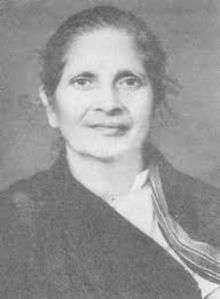Sarala Devi
Sarala Devi (19 August 1904 – 4 October 1986) was an Indian independence activist, feminist, social activist, politician and writer. She was the first Odia woman to join the Non-cooperation movement in 1921. She became the first woman to be elected to the Odisha Legislative Assembly on 1 April 1936. She was also the first female Speaker of the Odisha Legislative Assembly, the first woman Director of Cuttack Co-operative Bank, first female Senate member of Utkal University, and the first Odia woman delegate of the Indian National Congress. She was the only representative from Odisha on President Dr S. Radhakrishnan's Education Commission.
Sarala Devi | |
|---|---|
ସରଳା ଦେବୀ | |
 | |
| Born | 19 August 1904 Narilo village, Orissa Division, Bengal Presidency, British India |
| Died | 4 October 1986 (aged 82) |
| Nationality | Indian |
| Home town | Cuttack |
| Political party | Indian National Congress |
| Spouse(s) | Bhagirathi Mohapatra
( m. 1917) |
| Children | 1 son |
| Parents |
|
| Relatives | Balamukunda Kanungo (uncle) Nirmala Devi, poet (sister) Rai Bahadur Durga Charan Das (brother-in-law) Nityanand Kanungo (brother) Bidhu Bhusan Das (nephew) |
Early life
Sarala Devi was born on 19 August 1904 in Narilo village, near Balikuda, in what was then the Orissa Division of the Bengal Presidency (now in Jagatsinghpur district, Odisha) to a very wealthy, aristocratic Zamindar family. Her father was Dewan Basudev Kanungo, and her mother was Padmavati Devi. She was adopted and raised by her father's elder brother, Balamukunda Kanungo, a Deputy Collector.[1][2][3][4][5][6] Sarala received her primary education in Banki, where her uncle was posted. Women had no access to higher education, at the time, so her uncle hired the services of a home tutor. Sarala learned Bengali, Sanskrit, Odia and basic English from her tutor. She lived with her uncle until the age of 13.
Public Life
While in Banki, Sarala was inspired by stories of Suka Devi, the queen of Banki, to join the independence movement. She donated a sizeable part of her large collection of jewellery and vast tracts of real estate to the fight for India's independence. She married well-known lawyer Bhagirathi Mohapatra in 1917, and the latter joined the Indian National Congress in 1918. Sarala herself joined the Congress in 1921, following Mahatma Gandhi's first visit to Orissa. She was the first woman Member of the Odisha Legislative Assembly as well as its first woman Speaker. She was very close to Mahatma Gandhi, Jawaharlal Nehru, Durgabai Deshmukh, Acharya Kripalani, Kamaladevi Chattopadhyay and Sarojini Naidu.[7] She was the Secretary of Utkal Sahitya Samaj at Cuttack from 1943 to 1946.[8]
Literary works
Sarala wrote 30 books and 300 essays.[9][10]
- Bishwa Biplabani, 1930
- Utkalaa Nari Samasya, 1934
- Narira Dabi, 1934
- Bharatiya Mahila Prasanga,1935
- Rabindra Puja, 1935
- Beera Ramani, 1949
- Debi, Sarala (1963). Raya Ramananda (in Odia). Odisa Sahitya Ekademi. OCLC 19014670.
- Sarala Debi; Mohanty, Sachidananda; Forbes, Geraldine (2016). The Lost World of Sarala Devi : Selected Works. ISBN 978-0-19-946667-2. OCLC 992496394. Translated from Oriya.
- Sarala Debi (1935). Nari Jagata (in Odia). OCLC 1046977239.
- Sarala Debi; Rauta, Bholanatha; Acaryya, Mahendra Kumara (2017). Saraladebi Racanabali (in Odia). OCLC 1105736602.
References
- "Sarala Devi: A centenary tribute". The Hindu. 7 November 2004. Retrieved 18 December 2016.
- Mohanty, Sachidananda. "Sarala Devi: The Biplababi of Orissa" (PDF). Manushi. Retrieved 18 December 2016.
- Mohanty, Sachidananda. "Sarala Devi: The Biplababi of Orissa" (PDF). Manushi. Retrieved 18 December 2016.
- Jena, Bijaya Lakhmi (January 2014). "Sarala Devi, An Inspiration for Women" (PDF). Government of Odisha. Retrieved 18 December 2016.
- Prabhukalyan, Mohapatra (January 2008). "Oriya Women in National Movement" (PDF). Government of Odisha. Retrieved 18 December 2016.
- Dhyanimudra, Kanungo (August 2014). "Sarala Devi as a Freedom Fighter" (PDF). Government of Odisha. Retrieved 18 December 2016.
- Giri, Pradeep Kumar (August 2016). "The Role of Odia Women in Salt Satyagraha : Sarala Devi" (PDF). Government of Orissa. Retrieved 18 December 2016.
- Ratha, Prabodha Kumar (August 2013). "Sarala Devi : the Socio-Political Reformer of Odisha" (PDF). Government of Odisha. Retrieved 18 December 2016.
- Dasgupta, Sanjukta (30 October 2016). "More than just 'presiding deities in their kitchen'". The Statesman. Retrieved 18 December 2016.
- Mohanty, Sachidananda (7 December 2004). Early Women's Writings in Orissa, 1898-1950: A Lost Tradition. SAGE Publications India. p. 151. ISBN 9788132101956. Retrieved 18 December 2016.